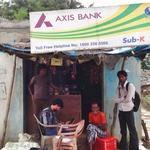Saving by default: Evidence from a field experiment in rural India
The literature shows large take-up rates, but a low usage of formal bank accounts in developing countries. We explore the role that the default option can play in bridging this gap. We sampled 442 villagers in rural India, who either had an account, or were asked to open one. They received weekly payments of Rs 150 for about 10 consecutive weeks, in which the only difference was the method of payment: we randomly allocated them to being paid on the account (treated) or in cash (control). In a cash economy, the money is saved by default for those who are paid on the account. On the other hand, people paid in cash have to take the active step of depositing it. Their default is having the money ready to spend. Our main finding is that being paid on the account increases the account balance by around 110 percent after 10 weeks of weekly payments. The effects are long lasting: 4 months after the last weekly payment, the average account balance of the treated is still twice as high as the balance of the control individuals. The results cannot be explained by standard decision making theory but are perfectly consistent with procrastination to save and inertia. We conclude that one solution to enhance savings on a formal account is moving from a cash to an account based payment system.
http://www.eudn.eu/paris-2014/








